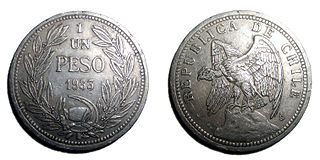This article needs additional citations for verification .(February 2024) |
| |||||
| Decades: | |||||
|---|---|---|---|---|---|
| See also: | |||||
The following lists events that happened during 1986 in Chile.
This article needs additional citations for verification .(February 2024) |
| |||||
| Decades: | |||||
|---|---|---|---|---|---|
| See also: | |||||
The following lists events that happened during 1986 in Chile.

The Chicago Boys were a group of Chilean economists prominent around the 1970s and 1980s, the majority of whom were educated at the Department of Economics of the University of Chicago under Milton Friedman and Arnold Harberger, or at its affiliate in the economics department at the Pontifical Catholic University of Chile. After they finished their studies and returned to Latin America, they adopted positions in numerous South American governments including the military dictatorship of Chile (1973–1990), as economic advisors. Many of them reached the highest positions within those governments. Ronald Reagan and Margaret Thatcher were influenced by Chile's policies and economic reforms.

Presidential elections were held in Chile on 4 September 1970. Salvador Allende of the Popular Unity alliance won a narrow plurality in a race against independent Jorge Alessandri and Christian Democrat Radomiro Tomic, before having his victory confirmed by a contingent election after the Christian Democrats voted in favour of his candidacy.

The Santiago General Cemetery in Santiago, Chile, is one of the largest cemeteries in Latin America with an estimated two million burials. The cemetery was established in 1821 after Chile's independence when Bernardo O'Higgins inaugurated the Alameda de las Delicias along the old course of the Mapocho River. O'Higgins set aside more than 85 hectares of land for the foundation of what became a magnificent grounds filled with ornate mausoleums surrounded by palm and leaf trees set amidst lush gardens and numerous sculptures, which have been estimated be 237. The cemetery, which is located northwest of Cerro Blanco, serves as a true urban park for Santiago located in the municipality of Recoleta.

Jorge Eduardo Alessandri Rodríguez was the 26th President of Chile from 1958 to 1964, and was the candidate of the Chilean right in the crucial presidential election of 1970, which he lost to Salvador Allende. He was the son of Arturo Alessandri, who was president from 1920 to 1925 and again from 1932 to 1938.

General elections were held in Chile on 11 December 1993 to elect the President, members of the Chamber of Deputies and elected members of the Senate. Eduardo Frei Ruiz-Tagle of the Concertación alliance was elected President, and the alliance also won a majority of seats in the Chamber of Deputies and maintained its majority in the Senate. As of 2024, this is the most recent presidential election that did not result in a runoff.
The Chilean Council of State was a body set up by the junta of General Augusto Pinochet to produce a constitution in order to legitimise military rule. The constitution which it produced was approved in a 1980 plebiscite.

Jaime Jorge Guzmán Errázuriz was a Chilean constitutional law professor, politician, and founding member of the conservative Independent Democratic Union party. In the 1960s, he strongly opposed the University Reform movement and became an active organizer of the Gremialist movement. Guzmán vehemently opposed President Salvador Allende and later became a trusted advisor of General Augusto Pinochet and his dictatorship. As a professor of Constitutional Law, Guzmán played a significant role in drafting the 1980 Chilean Constitution. He briefly served as a senator during the transition to democracy before being assassinated in 1991 by members of the communist urban guerrilla organization group, the Manuel Rodríguez Patriotic Front (Autonomous).

Alberto Arturo Miguel Bachelet Martínez was a Chilean Brigadier General of the Chilean Air Force. He opposed the 1973 coup of General Augusto Pinochet, and was imprisoned and subject to torture for several months until his death in 1974 of heart disease while in prison. His daughter Michelle Bachelet has been twice elected President of Chile.

The National Party was a Chilean political party formed in 1966 by the union of the United Conservative Party, the Liberal Party and the National Action.

On 11 March 1990, Chile the military regime of General Augusto Pinochet ended and was replaced by a democratically elected government. This transitional period lasted roughly two years although some processes may have lasted significantly longer. Unlike most democratic transitions led by either the elite or the people, this democratic transition process is known as an intermediate transition – a transition involving both the regime and the civil society. Throughout the transition, as the regime increased repressive violence, it simultaneously supported liberalization – progressively strengthening democratic institutions and gradually weakening that of the military.

Augusto José Ramón Pinochet Ugarte was a Chilean army officer and military dictator who ruled Chile from 1973 to 1990. He was the leader of the military junta from 1973 to 1981, and was declared President of the Republic by the junta in 1974 and thus became the dictator of Chile, and from 1981 to 1990 as de jure president after a new constitution which confirmed him in the office was approved by a referendum in 1980. His time in office remains the longest of any Chilean ruler.
Events in the year 1973 in Chile.
Events in the year 1974 in Chile.
The following lists events that happened during 1896 in Chile.
The following lists events that happened during 1975 in Chile.
The following lists events that happened during 1976 in Chile.
The following lists events that happened during 1978 in Chile.
The following lists events that happened during 1982 in Chile.
The following lists events that happened during 1985 in Chile.

An assassination attempt was made on Chilean dictator Augusto Pinochet on 7 September 1986, when members of the urban guerrilla group Manuel Rodríguez Patriotic Front ambushed a motorcade carrying the dictator to Santiago.